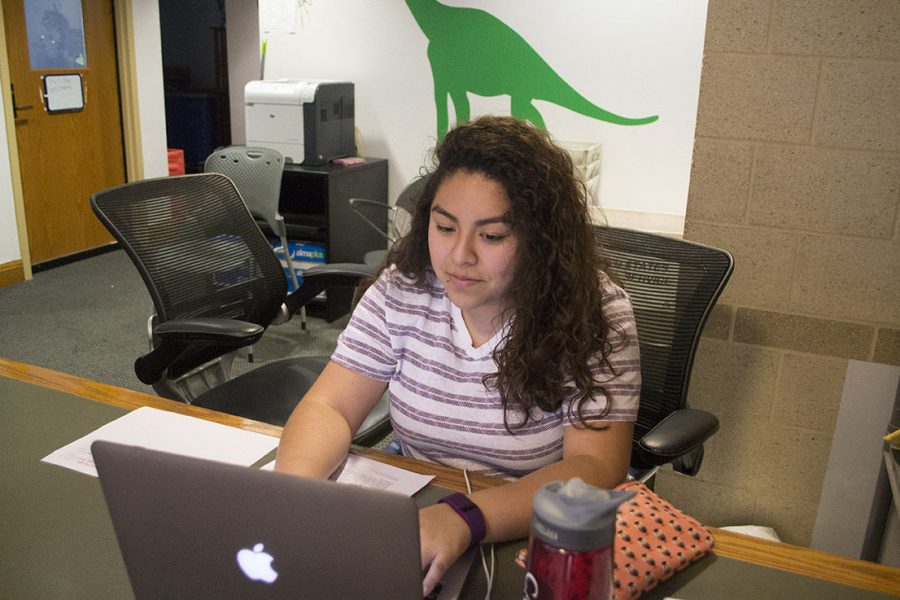HR policy forces RAs to choose between on-campus positions
Junior Nixi Cruz-Sanchez, a desk worker, is one of many students that could be affected by the student employment policy that limits a work week to 20 hours.
A policy that has been in the student employment handbook for years is going to be enforced next semester.
“The university will enforce a university policy that has been in place but not monitored or tracked,” Residence Life Director Alicia Vela wrote in her email to resident assistants, obtained by Hilltop Views, on March 22.
The policy limits students to work no more than 20 hours in a one-week period.
One group of students that will be impacted by the enforcement of this policy are resident assistants.
In her email to RAs Vela wrote that they would “not be permitted to have another work study, student employment or paid leadership position on campus while serving as an RA.”
“The resident assistant position is slated as a 20 hour a week position,” Vela said. “All student employees are held to working 20 hours per week, thus, RAs will only work their RA position.”
Although this policy will limit RA employment opportunities, Vela said that she’s “going to work with [students] individually to see what additional assistance they can receive from student financial assistance.”
Citing the Affordable Care Act, Vela also specified that RAs “are now being asked to log in their hours every week.”
Previously, RAs were not required to keep track of their hours worked. RAs get paid a cash stipend every two weeks and get their room and board paid for in full through a scholarship, according to the 2016-2017 Resident Assistant Agreement that they signed on March 4.
The agreement specifies that first year RAs get a cash stipend equal to $43.75 every two weeks. Second year RAs get $56.25 and third year RAs get $75, regardless of actual hours worked.
Human Resources Assistant Vice President Rosemary Rudnicki cited upgrades to the timekeeping system and the university’s implementation of Banner as the reason for their improved ability to enforce the policy.
“What has happened is we are able, or better equipped to monitor hours worked,” Rudnicki said. “We are looking at this more closely because we’ve got the new technology, and new systems. We’re really wanting to make sure that we’re sticking to what that policy has been for years.”
Rudnicki, Vela and Doris Constantine, associate vice president of Student Financial Affairs, insisted that the policy has always been in place. The confusion arose among RAs because, although the policy is outlined in the student employment handbook, it is not stated outright in the agreements they have to sign each year with Residence Life.
The Resident Assistant Agreement states that “ … internships and/or paid employment must be discussed with and approved by your current/future residence director before taking on a new role; regardless if these are on/off campus.”
This specification suggests that RAs are allowed to hold other on campus jobs as long as they are cleared by their RD.
An RA, who asked to remain anonymous out of fear of facing disciplinary action from Residence Life, said that he had not received an email last year notifying them of the 20 hour policy.
He said that this was the first time he had been notified of the policy by Residence Life.
The anonymous RA said that he was surprised to get the email and that “there has been no provision in the contract saying that students cannot hold any other campus position.”
“[Applicants] have to give up their on-campus jobs and their work-study to become RAs,” he said. “I think that’s a slightly unreasonable request by Residence Life. Students have been fantastic RAs in the past while holding other on-campus jobs.”
The RA said that he knows how hard it is for RAs to find employment off-campus and that he wished that Residence Life would have told them about this policy before they applied for the positions.
“The reason for the communication about working the 20 hours is because that has always been the policy and we want to make sure that we’re abiding by that policy,” Rudnicki said.
Rudnicki stressed that this policy was not implemented to save the university money, but instead was instated in the best interest of students’ time management.
“We are very committed to having our students be successful,” Rudnicki said. “What this is going to do, I hope, is that it will allow for more students to be able to be employed because those jobs that are being taken by [students with] second jobs or third jobs, another student will be able to fill that job.”
Rudnicki added, “We’re not looking at a lot of folks that are going over the 20 hours.”
Although the rule clearly states that RAs are not to work other jobs on campus, many of them hold multiple jobs, both on and off-campus.
Vela and Constantine are insistent that they do not.
“All of the RAs do not work a second job,” Vela said. Constantine added, “It’s a small percent [of students]. It’s a few of them. The important thing to realize is we’re talking about a handful so it is just a few students whose employment exceeds the current [rule].”
If you are affected by this policy, please contact [email protected].







